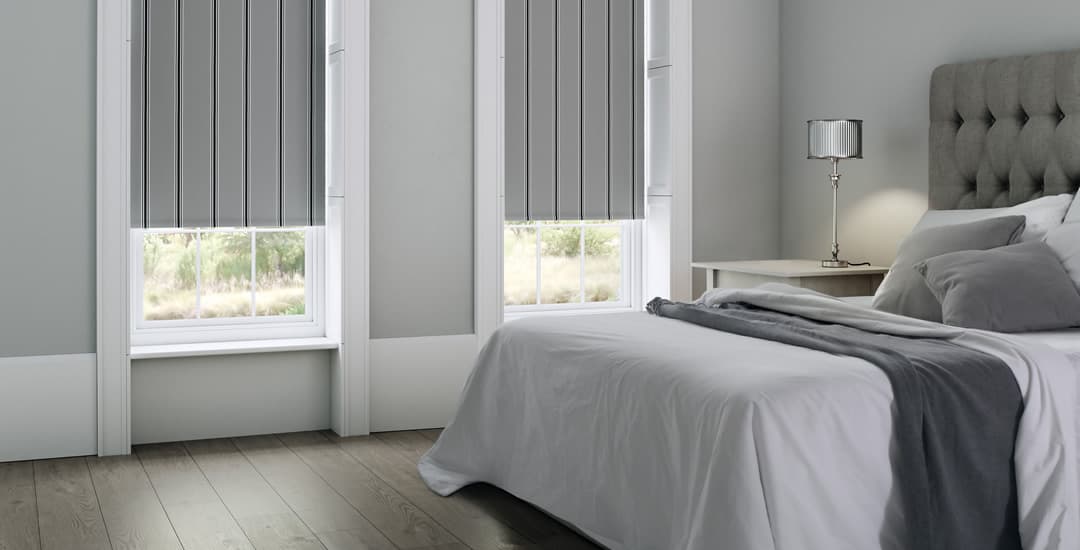
What blinds are best for the bedroom? For many people, the correct answer to this is “blinds that keep the sun out until you’re good and ready to see it.” For me on the other hand, it’s “blinds with glow in the dark stars on them” which somehow don’t annoy me when I’m sleeping.
There are a number of different things that can dictate what blinds are best for the bedroom of any individual sleeper, and aesthetic considerations and how you want your bedroom to look is an important part of this too.
In this blog post, I’ll cover everything you didn’t know you needed to know about blinds for bedrooms.
Do blinds look good in bedrooms?
Yes, though obviously different blinds will suit different types of bedrooms. If your general theme is lots of velvet, mood lighting, and gold leaf, you’re probably going to want to swerve away from a modern-looking white faux-wood blind in favour of an opulent Roman blind, whereas if your bedroom is light, airy, and minimalistic, the opposite would likely apply.
Window blinds for bedrooms come in a huge range of types; there are no blinds that can’t work in bedrooms in terms of function or coping with the vagaries of their environment. This means that when it comes to the type or style of blind, the sort of colours you choose it in, patterns and designs for some options, and the trims or controls that you want, the world of bedroom blinds is your oyster.
One thing I would say on a style note (and others are free to disagree) is that blinds come in more or less every style you can think of, from period and traditional to minimalistic or futuristic; but this is less true for curtains.
Curtains certainly come in a range of styling options for things like the pleat pattern or way they fall, the hooks or tapes at the top, and whether or not you have a pelmet and/or tie backs and how they look, but also curtains do kind of look a bit dated (regardless of style or theme) in certain types of bedrooms, chiefly those that are modern in styling themselves.
One last thought if you really can’t decide which side of the curtains versus blinds fence you fall on; you can always have both, as in, blinds inside of the window recess and curtains (or decorative voiles) outside of it. This is also one way to ensure 100% blockage of external light! On which note…
What type of blinds are best for bedrooms if light wakes me up?
The really short (and probably not so useful) answer to this is blackout blinds, but I’m sure that exactly 99.9% of the UK probably already knows this, so I do feel like master of the flaming obvious for stating it.
For those that don’t know about blackout blinds, they’re blinds that are made to block external light from seeping though their fabric/material (and that also stop light from inside leaking out and contributing to light pollution too).
The term “blackout blinds” doesn’t refer to a model or style of blinds per se; it refers to blinds that have sun-deflecting superpowers either thanks to their material’s innate lack of light-get-through-ability (such as say, blinds made of solid materials like wood) or because they’re made with a special blackout lining or coating to power up their performance in this respect.
Any type of blinds can be made in blackout options; some blinds are blackout blinds by default.
- If you buy Venetian blinds, faux-wood blinds, or wooden blinds, their blackout ability is innate, albeit you will get some light around the edges of the blind and a tiny bit of pinprick-sized light leakage if you buy blinds of this type with cords rather than ladder tapes.
- If you buy roller blinds, Roman blinds, vertical blinds, or day and night blinds, these can all be made in blackout options. However, unless this is offered or mentioned in the blind’s description, don’t assume that they’ll be blackout blinds by default.
- It is important to note that how you hang blackout blinds has an impact on how well they block external light; find out more about how to hang blackout blinds for maximum effect here.
How do I choose blinds for my bedroom if I don’t want to block morning light entirely?
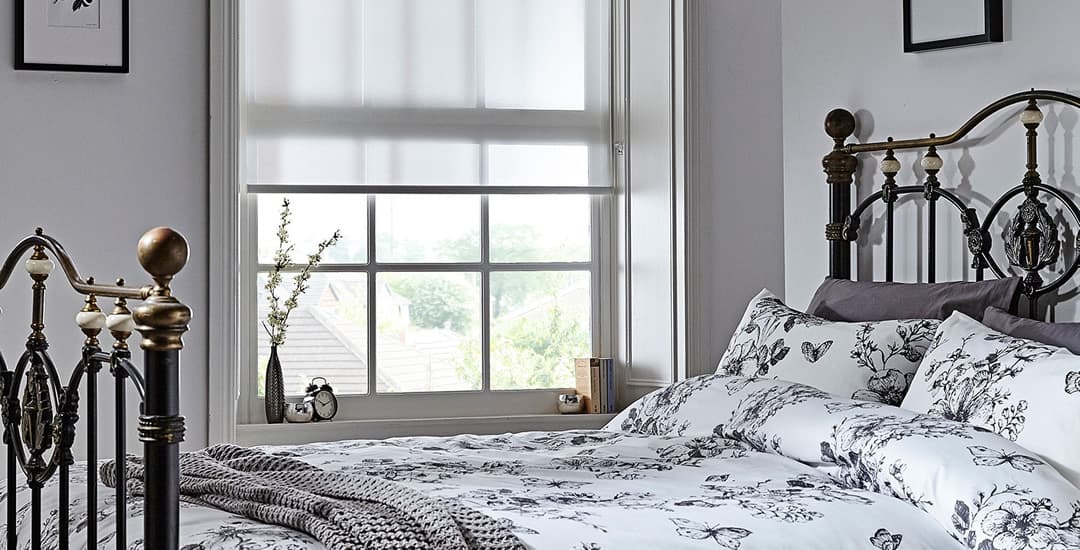
It is worth noting that some people don’t get on with blackout blinds, as they find the full light blocking effect of them disorienting; when they wake up they have no natural indicator of whether it’s the middle of the night or they’re already an hour late for work.
Additionally, waking up “cold” to an alarm rather than your eyelids beginning to let a little dim light filter through can also be jarring for some people, meaning that they’re apt to spend most of the morning grumpy because they were shocked awake, and/or wondering what was going to happen in the second half of the awesome dream that got so rudely interrupted.
If either of these descriptions sound like you, this may mean that dim-out blinds rather than blackout blinds are the way to go.
Roller blinds, Roman blinds, vertical blinds, and day and night blinds that aren’t blackout blinds are known as “dim-out blinds.” The extent to which they hit the mute button on the sun can vary, but many people find that unless you buy very cheap/flimsy ones and/or are really sensitive to light, they’re perfectly fine to allow you to sleep past dawn.
Roman blinds in particular tend to be made of fairly thick material even in non-blackout options, and can make rooms surprisingly dim when closed, even when the sun’s cracking the pavements outside.
Also, not wanting your blinds to block all of the morning sun can still be achieved if you pick Venetian, wood, or faux-wood blinds and just tilt their slats to a tiny fraction open before bed to let a small amount of light to filter through the next day.
What blinds are best for the bedroom that gets really cold in winter?
Blinds can help to insulate a room and help to block draughts to quite a reasonable degree; assuming that your window is the weak link in the cold-defending front, rather than that you live in a shed. This is true for blinds of all types, but some blinds are specifically designed with a lining or coating that is deliberately thermally insulating too.
Choosing thermally insulating blackout blinds can make a measurable difference to the ambient temperature of your bedroom in winter, and/or reduce the heating spend required to keep the room at the sort of temperature you like.
How do I choose blinds for my bedroom?
There are no types of blinds that are by nature unsuitable for bedrooms; if this seems like a bit of a disjointed comment, for context, there are certain blinds that you could not use (or would not be wise to use) in bathrooms and kitchens, being blinds that aren’t waterproof.
This means then that what blinds are best for the bedroom you’re working with depends on what you want them to do (block or just dim light, offer light filtering and privacy control too, thermally insulate the room and so on) and also, how you want them to look.
If you need some pointers in this respect, I’ll cover all of the popular types of window blinds you might be considering getting for your bedroom below, to tie us off.
Are roller blinds good for bedrooms?
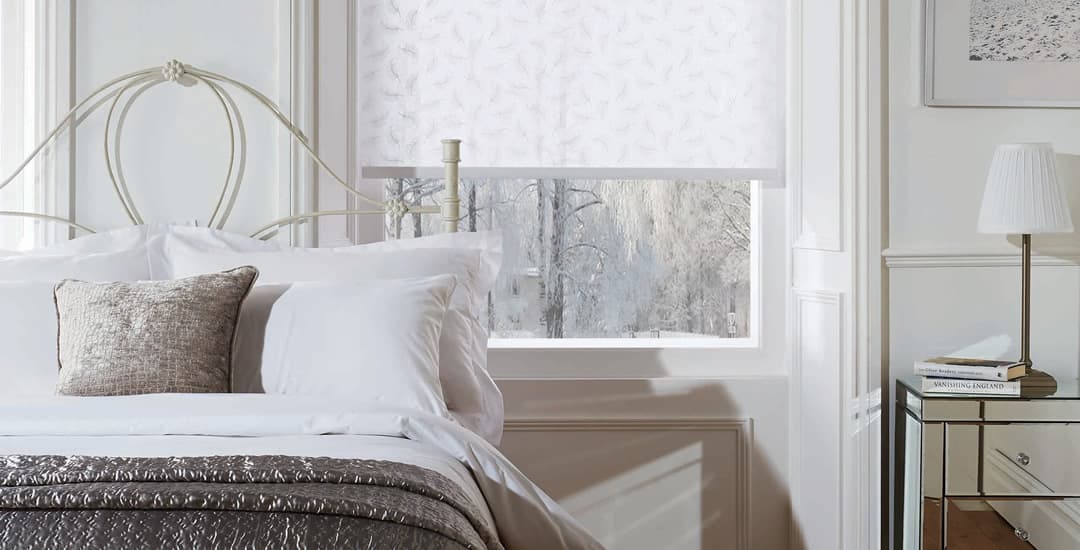
Roller blinds are one of the most popular blinds for bedrooms, for a number of reasons.
- Like for like, roller blinds are usually the most economical type of blinds to buy.
- Roller blinds for bedrooms can be made in either dim-out or blackout fabrics, and also with thermally insulating linings.
- Roller blinds are the style of blinds that comes in the widest range of colour and pattern or design options.
- Roller blinds can be open, closed, or somewhere in between, but they can’t be used to filter light and maintain your privacy without occluding your view like blinds that can be tilted or slanted can.
Are wooden blinds good for bedrooms?
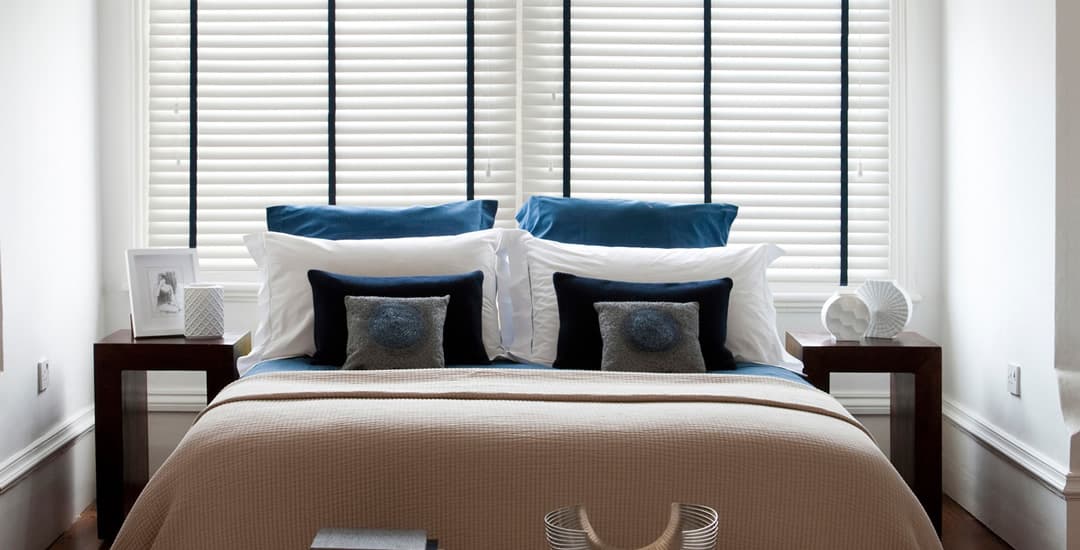
Wooden blinds look fantastic in certain styles of bedrooms.
- Wooden blinds can be finished in a colour and style to emulate all of the most popular types of wood that might be used to make your other bedroom furniture.
- Wood is a natural insulator and so can help to take the edge off chilly bedrooms and block draughts.
- Wooden blinds have tiltable slats to allow you to filter light if you wish, and manage your privacy.
- When fully closed, wooden blinds block out most of the light.
- Wooden blinds tend to fall in the higher half of the pricing scale for window blinds, in reflection of the fact that sustainably sourced wooden blinds are an eco-friendly, natural product.
Are faux-wood blinds good for bedrooms?
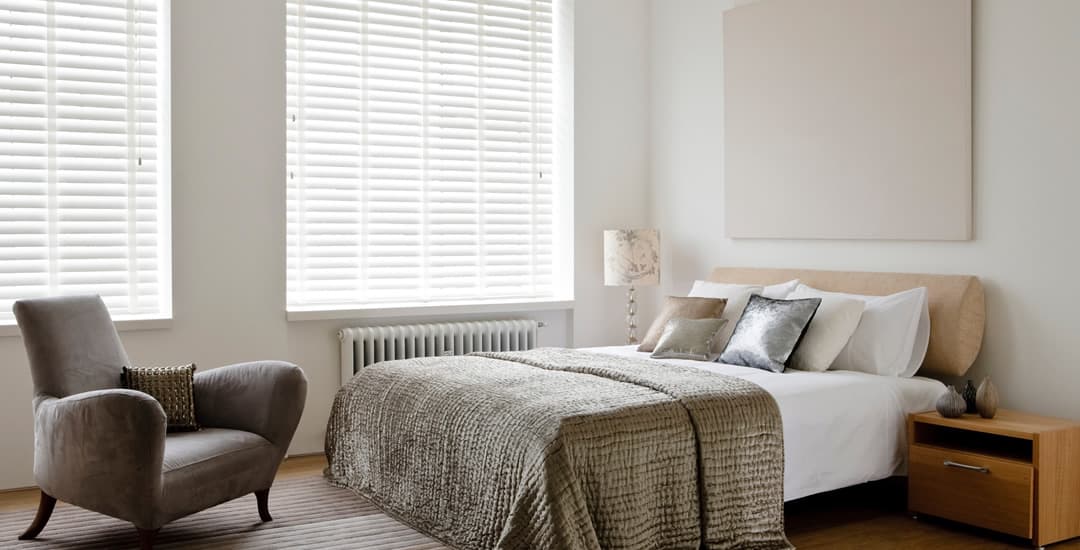
Faux-wood blinds are virtually indistinguishable from real wood blinds, albeit they tend to have slightly thicker slats.
- Faux-wood blinds can be finished to emulate a number of real woods, or painted in a wide spectrum of colours.
- Faux-wood blinds provide excellent window insulation; even more so than real wood blinds.
- Faux-wood blinds allow you to manage privacy and light filtering thanks to their tiltable slats.
- Closed faux-wood blinds are effective at blocking out most of the light.
- Price wise, faux-wood blinds are less costly than real wood blinds.
- One point to note is that faux-wood blinds shouldn’t be used for a bedroom window that is over or right next to a large or powerful radiator, as prolonged exposure to extremes of heat can warp their slats.
Are vertical blinds good for bedrooms?
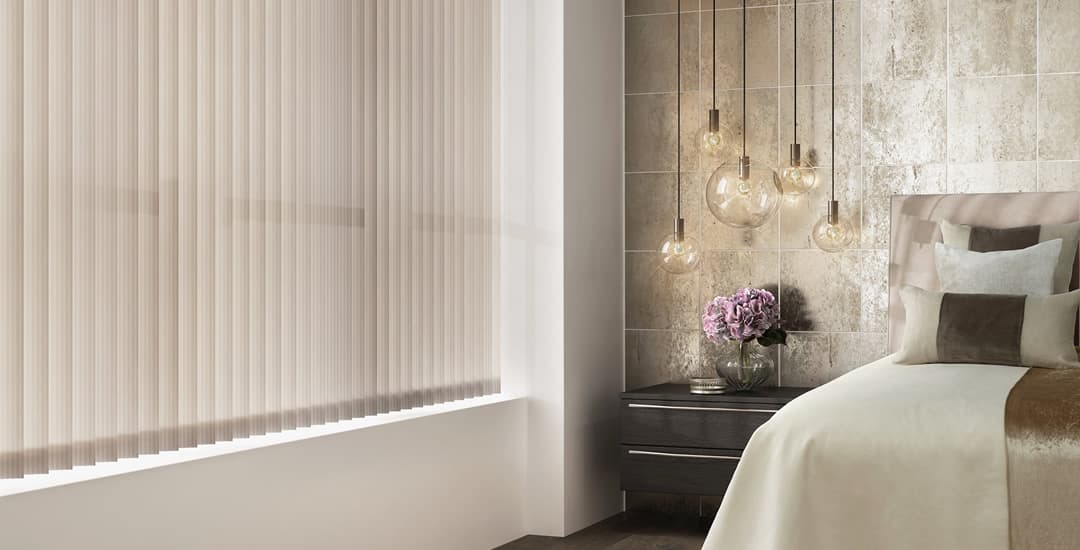
Vertical blinds are actually a very good choice for bedroom blinds, and they have a lot of points in their favour.
- Vertical blinds are blinds that many people associate with workplaces, but if that’s you then you’ve probably not checked out all of the colours and finishes that they can be made in these days!
- Vertical blinds can be made in either dim-out or blackout fabrics.
- Their louvres can be rotated to filter light and allow you to control your privacy.
- Vertical blinds are cost-effective, generally falling at the same sort of price point as roller blinds for some options.
- Vertical blinds also come with thermally insulating options across some of the range.
Are Roman blinds good for bedrooms?
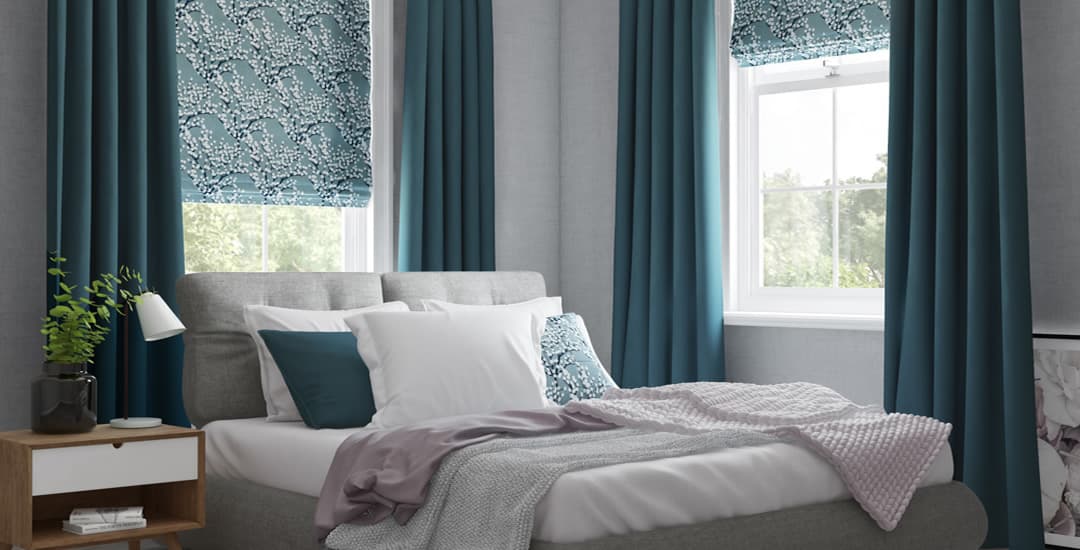
Roman blinds are opulent and luxurious, and will add a real touch of panache to your boudoir, darling.
- Roman blinds can be made in a wide range of fabrics and designs.
- Roman blinds can be made with blackout linings.
- Even Roman blinds without a blackout lining will tend to allow only a small amount of light through, as they’re made of thick, high-quality fabrics.
- All Roman blinds rank quite well for window insulation, but you can also request them to be made with a thermally insulating lining for added impact.
- Roman blinds don’t allow you to filter light, however; they’re open, closed, or partially closed only.
- Roman blinds are generally the most expensive type of blinds to buy.
Are Venetian blinds good for bedrooms?
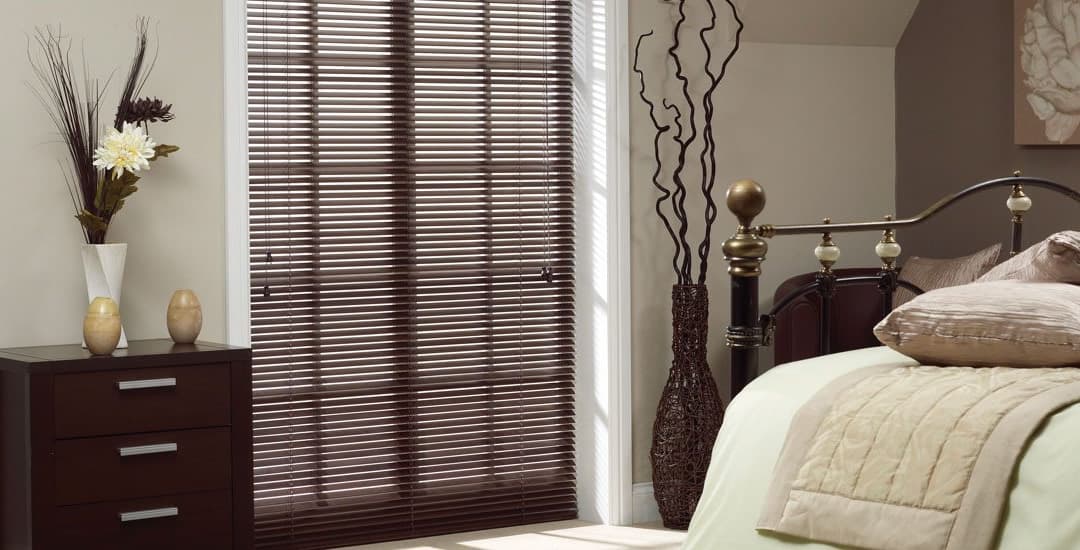
Aluminium Venetian blinds really suit modern or minimalistic bedrooms in particular.
- Venetian blinds can be made in a wide range of colours and finishes.
- When closed, Venetian blinds block most external light although there may be a tiny degree of light leakage around the edges of the blind and where the cords that run through the slats.
- Venetian blinds allow you to tilt their slats to filter light and balance your ability to enjoy the view with the ability of outsiders to see in.
- All blinds insulate to an extent when closed, but Venetian blinds are not one of the most effective window insulators.
- Venetian blinds are one of the more economical types of blinds to buy.
Are day and night blinds good for bedrooms?
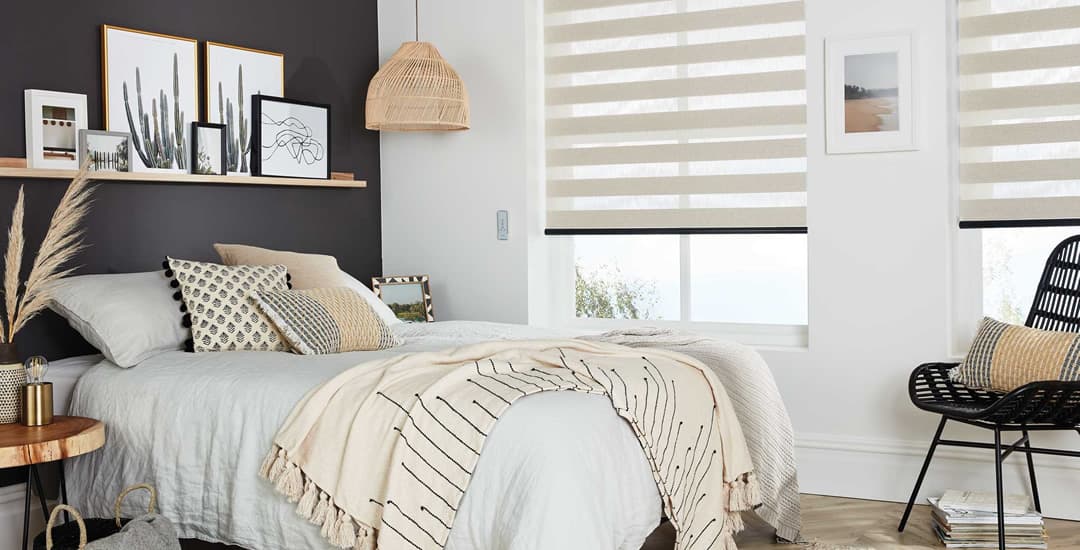
Finally, Day and night blinds or zebra blinds look amazing in certain types of bedrooms, and children tend to love them thanks to their stripes!
- Day and night blinds come in a range of colour options for their opaque stripes, as well as many material choices for the sheer stripe.
- Day and night blinds can be made with blackout fabrics.
- Day and night blinds are specifically made to allow you to maximise external light during the day at the same time as maximising your privacy from people outside, depending on how you align their stripes.
- Day and night blinds tend to fall towards the higher end of the price spectrum.
- Remember to align the stripes of day and night blinds to achieve a solid opaque panel of fabric at night, otherwise people outside will be able to see the interior of your bedroom very clearly via the sheer stripes of the blind when your lights are on!

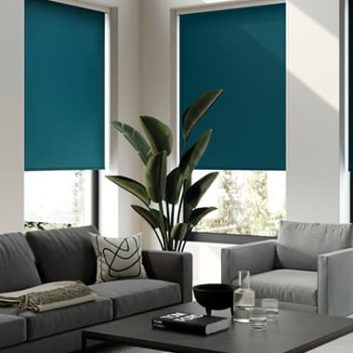
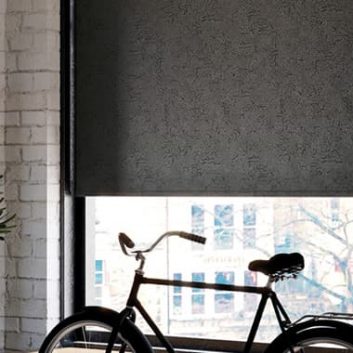
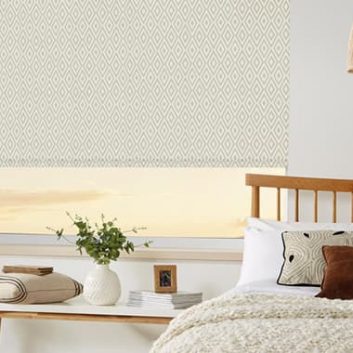
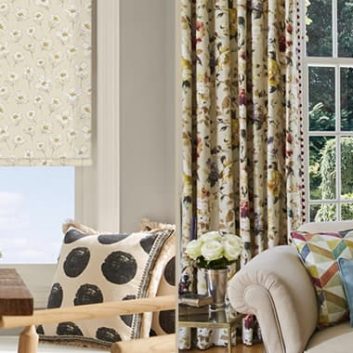
In my bedroom I have a computer desk near the window, to stop all light which type of blinds do you recommend and which colours are available?
Which type of blind is the best one to go for?
The best type of blind to go for if you’re looking to reduce the light as much as possible whilst using your computer is a blackout roller blind. They’re available in a wide range of plain colours as well as lots of patterned designs, you can view them all here.